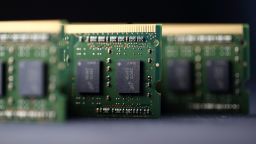Global politics will be dominated by the availability, trade and investment in microchips for the next several decades, Intel CEO Pat Gelsinger told CNN Tuesday.
The location of “oil reserves [has] defined geopolitics for the last five decades,” Gelsinger said in an interview with CNN’s Julia Chatterley at the World Economic Forum in Davos. “Where the technology supply chains are, and where semiconductors are built, is more important for the next 5 decades.”
Gelsinger said the company’s investment in new manufacturing facilities in the United States, Europe and elsewhere is important not only for the company’s future, but for the “globalization of the most critical resource to the future of the world.”
“We need this geographically balanced, resilient supply chain,” he said.
Intel (INTC) said last year it would invest $20 billion to build two new US chipmaking facilities, as well as up to $90 billion in new European factories, aimed at reasserting its position as the leader of the semiconductor industry. The announcements also came amid concerns about the concentration of manufacturing for chips, in Asia, particularly China and Taiwan, during the Covid-19 pandemic and as geopolitical tensions grew. Issues in the chip supply chain in recent years have caused shortages and shipping delays of everything from desktop computers and iPhones to cars.
“If we’ve learned one thing from the Covid crisis and this multi-year journey that we’ve been on it’s we need resilience in our supply chains,” Gelsinger said, adding that Intel’s manufacturing investments are aimed at “leveling that playing field so that good investment decisions can be made.”
Gelsinger — who took over as Intel’s chief executive two years ago during a difficult period for the company — acknowledged that the company’s investments in a decades-long strategy are coming during a difficult economic period.
“It’s a touch economic environment in the near term — Covid and China, Ukraine and energy in Europe, inflation in the US — you look across that and ask, ‘Where’s the good news?’” he said. “But at the same time, we need to make long-term investments, three quarter economic environments cannot dictate five- and six-year capital investment cycles … It’s a challenge to be a CEO these days.”
A US law passed last year to boost domestic chipmaking should help. The CHIPS and Science Act will invest more than $200 billion to help companies grow US domestic chip-making and research.
Now, Gelsinger said, Intel and other chipmakers are just waiting for the funds from the law to get dispersed, after President Joe Biden last year directed a steering committee including Commerce Secretary Gina Raimondo to determine how to implement the law and deploy the funds.
“We expect we’ll see those this year,” Gelsinger said of the CHIPS Act funds. “I’m investing, please show up with the money. Because we’re assuming they’ll help us make these massive investments.”

























